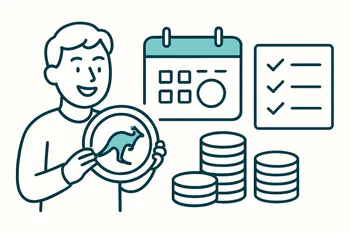How to Secure a Business Loan with Poor Credit: A Comprehensive Guide
- Personal Finance
- 03 Mins read

Navigating Business Loans with Poor Credit
Starting a business is no easy feat, and when your credit report reads like a rocky road, the journey to securing funding seems even more daunting. But, don’t lose hope. This comprehensive guide offers practical strategies to help you secure a business loan in Australia—even with poor credit.
Understanding Credit Scores
A credit score is a numerical expression based on analysis of a person's credit files. It represents creditworthiness—the likelihood you will repay debts. In Australia, credit scores range from 0 to 1200. A score below 500 is often considered poor. This might feel like a dead end, but there are paths to tread.
1. Where to Begin: Know Your Credit
First, review your credit report. You can obtain a free copy from any major credit reporting agency like Experian or Equifax once a year. Check for errors. If you find discrepancies, dispute them. Accurate information is crucial before approaching lenders.
2. Explore Alternative Lenders
Traditional banks might turn you down if you don’t tick all their boxes. Consider alternative lenders:
- Peer-to-peer lending: Platforms connecting you directly with investors willing to support your business.
- Microfinance institutions: Organisations that offer smaller amounts of credit with supportive loan terms.
- Community Development Financial Institutions (CDFIs): These offer credit to underbanked communities.
Tip: Research each option extensively. Each has different terms and requirements.
3. Government Assistance and Grants
The Australian government offers various programs to support small businesses. These grants and low-interest loans can be a financial lifeline. Check Business.gov.au for available opportunities.
"In my ten years as a mortgage broker, I've seen government grants act as critical stepping stones for many emerging businesses." — Nathan Smith
4. Build a Compelling Business Plan
A strong business plan can outweigh a weak credit score. Include detailed projections, potential growth areas, and risk management strategies. A well-crafted plan communicates your business's future potential to lenders.
5. Leverage Collateral or a Co-Signer
If possible, leverage any assets as collateral. Collateral reduces the lender's risk and can improve your loan prospects. Alternatively, consider a co-signer—someone with a strong credit score willing to back your application.
Debunking Myths: Guarantees Aren't Always Safe
Contrary to popular belief, guarantees don’t always shelter you from risk. Ensure you understand what collateral entails. If you can't repay the loan, collateral may be seized. Always consider this carefully.
6. Strengthen Your Application
Go beyond the numbers. Show past entrepreneurial successes or relevant experience. Lenders look for trustworthiness as well as fiscal responsibility. Provide testimonials and references to showcase reliability.
7. Consider Business Credit Cards
Business credit cards can help build your business credit. Use them responsibly—keep balances low and make timely payments. This can improve your credit score over time, broadening future loan options.
Getting Professional Help
Navigating loans can be complex. Seek the expertise of a financial advisor or mortgage broker. They provide insights into the loan market and connect you with potential lenders. ASIC-regulated advisors can help ensure you receive advice aligned with your best interests.
8. Tackle the Credit Issue Head-On
Work on improving your credit score over time. Pay outstanding debts, negotiate payment plans, and avoid new credit applications that trigger hard inquiries.
Key Takeaways
- Use alternative lenders and government loans if traditional banks decline your application.
- A strong business plan enhances credibility, make sure it stands out.
- Consider securing loans with collateral but be aware of risks involved.
- Responsible use of business credit cards can rebuild your credit.
Conclusion
Securing a business loan with poor credit in Australia is challenging but possible. Stay persistent, be informed, and choose the right paths slowly and carefully. Your credit score doesn't define your entrepreneurial potential.



